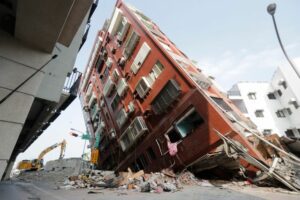Earthquake in Japan and Taiwan sends tremors of fear, devastation, and uncertainty. The recent seismic activity in these regions has sparked global concern and raised questions about preparedness, resilience, and recovery efforts. This article delves into the impact, aftermath, and lessons learned from the earthquakes that rocked Japan and Taiwan.
In Japan, Taiwan, seismic events are not uncommon occurrences due to their geographical location along the Pacific Ring of Fire. This volatile region is prone to frequent tectonic movements, resulting in earthquakes, volcanic eruptions, and tsunamis. Despite advancements in technology and infrastructure, the unpredictability of nature continues to challenge even the most resilient communities.
Table of Contents
Unleashing Chaos and Uncertainty
The recent earthquake in Japan and Taiwan has unleashed chaos and uncertainty, leaving a trail of devastation in its wake. As the affected regions grapple with the aftermath of the seismic event, stories of survival, loss, and hope emerge amidst the rubble.
The Devastating Impact: Scenes of Destruction and Despair
The earthquake, with a magnitude of 7.0, struck with sudden and terrifying force, catching residents off guard and causing widespread devastation. Buildings crumbled, roads cracked, and panic gripped the streets as communities were plunged into chaos. In the aftermath, the true extent of the destruction became painfully clear, with homes reduced to rubble, infrastructure severely compromised, and lives shattered.
Amidst the rubble and debris, tales of survival and loss unfold as residents recount harrowing experiences of escaping the quake’s fury. Families are torn apart, livelihoods destroyed, and communities left reeling from the emotional trauma of the disaster. The psychological toll of such calamities is immense, leaving scars that may never fully heal.
US Bridge Collapses: Shocking Footage Unveils Terrifying Reality!
A Glimmer of Hope: Missing Indians Found Safe
In the midst of the chaos and despair, a glimmer of hope emerges as two missing Indian nationals are found safe in Taiwan. The Ministry of External Affairs confirms the good news, bringing immense relief to their families and loved ones. The successful rescue operation underscores the importance of international cooperation and solidarity in times of crisis, reaffirming our collective commitment to helping those in need.
International Solidarity: Standing Together in Times of Crisis
As the affected regions begin the arduous process of recovery, the international community stands ready to offer support and assistance. From neighboring countries to global organizations, aid pours in to help with rescue and relief efforts, demonstrating the power of unity in times of crisis. Together, we stand shoulder to shoulder with Japan and Taiwan as they rebuild and recover from the devastation.
Learning from Adversity: Strengthening Resilience
The earthquake serves as a stark reminder of the unpredictable power of nature and the importance of preparedness and resilience. While both Japan and Taiwan have invested heavily in disaster mitigation measures, the recent seismic activity highlights the need for constant vigilance and adaptation to evolving threats. By learning from past experiences and strengthening infrastructure and response mechanisms, nations can better mitigate the impact of future disasters.
Embracing Hope: Rebuilding a Brighter Future
Despite the immense challenges ahead, hope prevails as communities come together to rebuild and restore what was lost. In the face of adversity, we stand united, stronger and more determined than ever to overcome whatever challenges may come our way. As Japan, Taiwan, and the rest of the world continue on the path to recovery, let us extend a helping hand and support each other in rebuilding a brighter, more resilient future.
Lessons Learned: Building Back Better
The earthquake serves as a crucial learning opportunity for both Japan and Taiwan, as well as the global community at large. By analyzing the response to the disaster and identifying areas for improvement, nations can enhance their preparedness and resilience in the face of future challenges. From revising building codes to investing in early warning systems, proactive measures can mitigate the impact of seismic events and save lives.
Havana Syndrome Strikes Russia: Unveiling the Enigma
Empowering Communities: Strengthening Local Resilience
While governments play a crucial role in disaster response and recovery, the resilience of communities is equally vital. Empowering local residents with knowledge, resources, and training can significantly enhance their ability to prepare for and respond to emergencies. Community-based initiatives, such as neighborhood disaster preparedness programs and first aid training, foster solidarity and ensure that no one is left behind in times of crisis.
Environmental Considerations
The earthquake highlights the delicate balance between development and environmental sustainability. Rapid urbanization and infrastructure expansion increase vulnerability to natural disasters, exacerbating the impact of seismic events. Incorporating environmental considerations into urban planning and development projects can minimize risks and build more resilient communities that coexist harmoniously with nature.
Continued Support: Sustaining Momentum in Recovery Efforts
Recovery from a disaster of this magnitude is a long-term process that requires sustained support and commitment from governments, organizations, and individuals alike. As the initial shock subsides and media attention wanes, it is crucial to maintain momentum in recovery efforts and ensure that affected communities receive the assistance they need to rebuild their lives. By staying engaged and providing ongoing support, we can help affected regions overcome the challenges ahead and emerge stronger than before.
Conclusion: Standing Together in Solidarity
In conclusion, the earthquake in Japan and Taiwan serves as a sobering reminder of the unpredictable power of nature and the importance of preparedness, resilience, and solidarity in times of crisis. As the affected regions embark on the path to recovery, let us stand together as a global community, offering support, assistance, and hope to those in need. Through collective action and unwavering determination, we can rebuild, restore, and create a brighter future for all.













